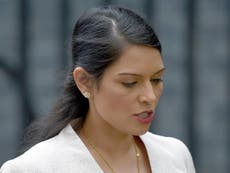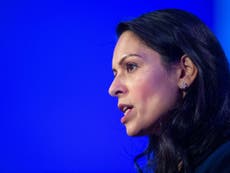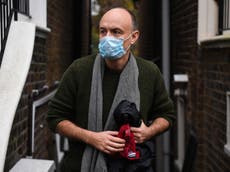Which top Downing Street officials have quit under Boris Johnson?
Sir Alex Allan has become the latest figure to quit his position over PM’s handling of Priti Patel allegations
Your support helps us to tell the story
From reproductive rights to climate change to Big Tech, The Independent is on the ground when the story is developing. Whether it's investigating the financials of Elon Musk's pro-Trump PAC or producing our latest documentary, 'The A Word', which shines a light on the American women fighting for reproductive rights, we know how important it is to parse out the facts from the messaging.
At such a critical moment in US history, we need reporters on the ground. Your donation allows us to keep sending journalists to speak to both sides of the story.
The Independent is trusted by Americans across the entire political spectrum. And unlike many other quality news outlets, we choose not to lock Americans out of our reporting and analysis with paywalls. We believe quality journalism should be available to everyone, paid for by those who can afford it.
Your support makes all the difference.Boris Johnson's adviser on ministerial standards, Sir Alex Allan, has joined a significant cast of officials who have left their roles in recent months after resigning over the prime minister’s handling of the Priti Patel bullying inquiry.
Sir Alex's decision comes after Mr Johnson contradicted conclusion the home secretary had broken the ministerial code with "behaviour that can be described as bullying".
A former chairman of the Joint Intelligence Committee, Sir Alex said his advice was that the home secretary had "not consistently met the high standards required by the ministerial code" in her treatment of civil servants – a finding that has traditionally led to the departure of government ministers.
With the 69-year-old opting to walk out of No 10, here is a look at which other top figures have left this year and what has been said about their departures.
Dominic Cummings - prime minister's most senior adviser
The de facto chief of staff in No 10 followed his Vote Leave ally Lee Cain out of Downing Street last week, with officials confirming he would work from home until formally vacating his post in mid-December.
Seen as one of the masterminds behind the Brexit referendum result and the Tory landslide at the last general election, Mr Cummings became nationally notorious after it was revealed he travelled 260 miles to his parents' home in Durham despite a ban on non-essential travel in the spring.
Following Mr Cummings' departure, former Brexit secretary David Davis said that many within No 10 had "turned against" the adviser.
He told BBC Breakfast: "The relationship with the Prime Minister fell off a cliff. And once that's gone, it's gone."
Lee Cain - Downing Street communications director
The sudden announcement of Mr Cain's resignation came less than 24 hours after reports that he would become the prime minister's chief of staff.
The former journalist said last week he would be leaving Downing Street at the end of the year and had taken the decision after "careful consideration".
Following the announcement, Mr Johnson said that Mr Cain had been "a good friend and ally" and would be "much missed".
Sir Jonathan Jones – government legal department
The Attorney General's office declined to confirm why Sir Jonathan had chosen to leave, but his departure came after the Financial Times reported he was in a dispute with Downing Street over concerns the prime minister wanted to row back on parts of the Brexit deal relating to Northern Ireland.
Following his departure, Labour's shadow attorney general Lord Falconer tweeted: "Jonathan Jones impressive lawyer and very decent person. Loyal civil servant.
"If he can't stay in the public service, there must be something very rotten about this Government."
Jonathan Slater – Department for Education
The permanent secretary at the Department for Education, Jonathan Slater, stood down when Mr Johnson "concluded that there is a need for fresh official leadership" after the A-Level results controversy.
His departure came a day after Sally Collier resigned from her role as head of exams regulator Ofqual.
Sir Mark Sedwill – Cabinet Office
Sir Mark Sedwill announced his departure from the role of Cabinet Secretary in June amid reports of clashes with Mr Cummings.
He has been replaced as the country's top civil servant by Simon Case, and said in July that "demoralising" anonymous criticism of officials has "risen in the last few years".
Sir Mark, in the speech at Oxford University's Blavatnik School of Government, said anonymous briefings are "damaging" to the process of governance because officials need the support of their leaders.
Sir Mark is being replaced as national security adviser by Mr Johnson's chief EU negotiator David Frost.
Sir Simon McDonald – Foreign Office
The Foreign Office's most senior civil servant, Sir Simon McDonald, seen as a Brexit critic, was told he had to step down before the department was merged with the Department for International Development (DfID).
After he stepped down in June, it was announced in early August that Sir Philip Barton had been appointed as the senior civil servant chosen to head the new Foreign, Commonwealth and Development Office.
Sir Richard Heaton – Ministry of Justice
The permanent secretary's departure was confirmed in July with his term ending in August.
Sir Philip Rutnam - Home Office
In February this year, the top civil servant at the Home Office, Sir Philip Rutnam, resigned, accusing Ms Patel of bullying.
Sir Philip, who was the Home Office's permanent secretary, quit after accusing Ms Patel of a "vicious and orchestrated briefing campaign" against him.







Join our commenting forum
Join thought-provoking conversations, follow other Independent readers and see their replies
Comments